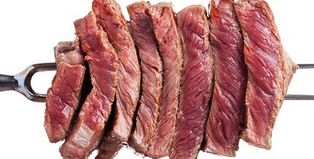Protein or protein diets are extremely popular with those who want to lose weight and are often followed by bodybuilders before they compete. Moreover, it helps to form a beautiful muscle relief, as it burns subcutaneous fat very effectively.
The main thing in this type of food
However, it has some disadvantages, due to which it is contraindicated for children, pregnant women, people suffering from chronic diseases and prone to blood clots, as well as for the elderly and very obese. It is better in a diet based on dairy products.The essence of a diet protein is that it is suitable for people who can not limit the amount of food they eat, as well as for those who can not imagine their daily diet without meat or fish.
The principle of the protein diet is that a person can eat any amount of protein food during the day, but it significantly reduces carbohydrate intake and almost completely gives up fat. Since carbohydrates and fats are the main source of energy for the body, and proteins are a kind of "building material". They are necessary for the growth of cells, but when they break down, the body receives little energy.
Therefore, the essence of the protein diet is that a person eats mainly protein foods and receives the necessary substances to maintain health, but at the same time does not meet the daily needs for calories.
As a result, the body is forced to compensate for the lack of energy by destroying fat deposits. Thus, a protein diet reduces body weight due to fat loss and not water or muscle mass. And weight loss does not have to be starving or eating monotonous foods, which is often the case with other diets.
Sources of protein
The main sources of protein are: lean meat, low-fat cottage cheese, chicken fillet, squid, turkey, peeled eggs, boiled eggs (without yolk), lean fish.
They should make up the bulk of your protein diet. And from sweets, pastries, potatoes, pasta, butter, fried foods and various sauces, you should give them up completely.
The need for carbohydrates is met by adding a limited amount of berries, fruits (excluding bananas and grapes) and vegetables (carrots, cabbage, tomatoes, peppers, cucumbers) to the diet. Buckwheat and oatmeal are acceptable. All these products should preferably be steamed, boiled or cooked without oil and fat.
Many foods can be eaten raw or made into salads. Although the diet is about avoiding fat altogether, sometimes a small amount of olive oil can be added to salads.
Eat small meals, four to six times a day.

In the morning and during the day, you can eat protein foods along with carbohydrates and in the evening, only protein is allowed.
At the same time, you should drink at least 1. 5 liters of clean water daily. It is recommended that you follow this diet for four weeks to get visible results.
Two weeks can be enough to lose five to eight pounds of weight.
However, it is highly undesirable to follow a protein diet for more than eight weeks - this can lead to health problems. This is due to the fact that the essence of a protein diet goes against the rules of a balanced diet, as a result of which the body begins to experience a lack of calcium, lack of vitamins and trace elements. This leads to fatigue and worsening of the skin and hair condition. Fortunately, this problem can be solved by taking vitamin and mineral supplements.
Also, a long-term protein diet increases the weight in the kidneys and raises blood cholesterol levels. Therefore, like the vast majority of diets, it is suitable for young, healthy and energetic people.




















